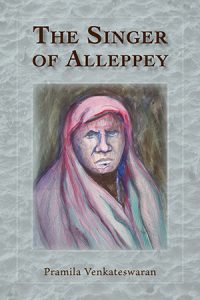 Review by MaryAnn L. Miller
Review by MaryAnn L. Miller
Pramila Venkateswaran, in addition to The Singer of Alleppey, has had six other books of poetry published and has won many awards. Raised in Bombay, Venkateswaran lives in New York and teaches English and Women’s Studies. She is a Poet Laureate of Suffolk County, NY. She directs Matwaala: South Asian Diaspora Poetry Festival.
Venkateswaran who never knew her grandmother Sitala, memorializes her as The Singer of Alleppey, who lived in southern India. Venkateswaran creates the persona of her grandmother, thus, also becoming the singer. Her story is divided into parts of a day, beginning appropriately with Night. The initial poem “The Long Shadow of Evil” sets the tone for Sitala’s poignant music. She recalls the slap she received from her groom at their wedding: the beginning of the abuse she would suffer in her marriage:
A bird bangs itself against glass and falls.
That’s how I feel when he slaps my face.
I know the difference between sinking dark
and womb dark: My marriage is dung. (13)
Sitala faced her marriage and wrung out every bit of joy, finding meaning in ordinary events as in “Come, Dance with Me In the Rain.”
I want to rub this song into the earth,
cup handfuls of wet mud and drink its smell…
Look at me dance,
my pirouettes have peeled the skin from my soles. (18)
Sitala is singing and dancing herself into oneness with the earth. She is saying: Don’t forget me. I existed. My skin is there in the mud. I don’t care if it kills me.
As she memorializes Sitala’s legacy Venkateswaran inserts a Tamil traditional children’s song into the poem “Lullaby to Ward Off Death.”
I sing kaiveesu amma kaiveesu
kadaiku polam kaiveesu, picking up
their little arms and swinging them
back and forth, imitating the stylish young. (28)
This song is documented on YouTube from several contemporary sources and I found myself fascinated listening to it in Tamil illustrated by charming cartoon children carrying out the activities of the “stylish young.” The cartoons describe going to temple, shopping and other daily events. (Mama Lisa, Bumble Bee) We are brought into the present through issues that women have faced in the past and still do. The political times are inevitably present in Sitala’s life.
There are poems here that talk about cow dung, miscarriages, births, Margaret Sanger, and the attempts in India during the 1960’s to curb the birth rate. Some might remember when vasectomies were freely performed in clinics at railway stations. Sitala speaks in Why I Could Not Plan My Family, 1960:
… All I want to say is I’m glad my daughter can visit doctors
to get advice about when to have babies and how many
instead of getting pregnant and trying to drink vile
cocktails produced by the local quack… (83)
The poem provides a pivot to the present that Venkateswaran deftly uses to place her grandmother’s experience into relevance to our own experiences of mothering or being mothered. She includes Notes (109) that explain Tamil references and language. There is another deftness that is evident in Venkateswaran use of poetic form. For example, her eloquent use of the pantoum in “Karma Blues” as Sitala reprises the pain of her husband’s true nature:
Can I recover the song I dreamed at dawn?
The cock’s shrill crowing scattered the notes
I held together with all my strength.
Mist fills the hollow where the song dwelled.
The cock’s shrill crowing shattered the notes
Like love silenced by a train whistle.
Mist fills the hollow where the song dwelled
Thickening as the hours pass. (42)
Finally, in “Single, 1947” the widow celebrates her freedom on the death of her husband: “A widow, / I’m free. / India is also free.” (86) There will be hired mourners at his funeral. (90) The fate of women is tied to the fate of the country. The persona of Sitala, in The Karmic Cycle, wrote a final letter to her daughters. (103) I found myself fortunate to be included in the receivership, savoring the skillful integration of language, persona, and poet through the historical richness of The Singer of Alleppey.
The Singer of Alleppey by Pramila Venkateswaran
Shanti Arts, 2018, 15.95 USD Paper, ISBN: 9781947067394
MaryAnn L. Miller (Cures for Hysteria, Finishing Line Press 2018.) has been twice nominated for a Pushcart Prize. Miller is the Poetry Coordinator for the NJ Book Arts Symposium. She publishes artists’ books through her Lucia Press.
